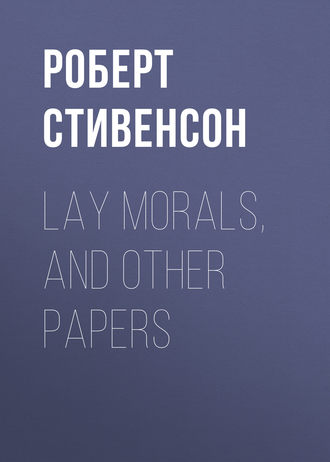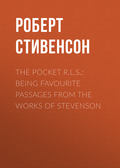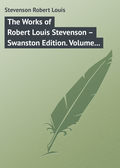
Роберт Льюис Стивенсон
Lay Morals, and Other Papers
CHAPTER III – DEBATING SOCIETIES
A debating society is at first somewhat of a disappointment. You do not often find the youthful Demosthenes chewing his pebbles in the same room with you; or, even if you do, you will probably think the performance little to be admired. As a general rule, the members speak shamefully ill. The subjects of debate are heavy; and so are the fines. The Ballot Question – oldest of dialectic nightmares – is often found astride of a somnolent sederunt. The Greeks and Romans, too, are reserved as sort of general-utility men, to do all the dirty work of illustration; and they fill as many functions as the famous waterfall scene at the ‘Princess’s,’ which I found doing duty on one evening as a gorge in Peru, a haunt of German robbers, and a peaceful vale in the Scottish borders. There is a sad absence of striking argument or real lively discussion. Indeed, you feel a growing contempt for your fellow-members; and it is not until you rise yourself to hawk and hesitate and sit shamefully down again, amid eleemosynary applause, that you begin to find your level and value others rightly. Even then, even when failure has damped your critical ardour, you will see many things to be laughed at in the deportment of your rivals.
Most laughable, perhaps, are your indefatigable strivers after eloquence. They are of those who ‘pursue with eagerness the phantoms of hope,’ and who, since they expect that ‘the deficiencies of last sentence will be supplied by the next,’ have been recommended by Dr. Samuel Johnson to ‘attend to the History of Rasselas, Prince of Abyssinia.’ They are characterised by a hectic hopefulness. Nothing damps them. They rise from the ruins of one abortive sentence, to launch forth into another with unabated vigour. They have all the manner of an orator. From the tone of their voice, you would expect a splendid period – and lo! a string of broken-backed, disjointed clauses, eked out with stammerings and throat-clearings. They possess the art (learned from the pulpit) of rounding an uneuphonious sentence by dwelling on a single syllable – of striking a balance in a top-heavy period by lengthening out a word into a melancholy quaver. Withal, they never cease to hope. Even at last, even when they have exhausted all their ideas, even after the would-be peroration has finally refused to perorate, they remain upon their feet with their mouths open, waiting for some further inspiration, like Chaucer’s widow’s son in the dung-hole, after
‘His throat was kit unto the nekké bone,’
in vain expectation of that seed that was to be laid upon his tongue, and give him renewed and clearer utterance.
These men may have something to say, if they could only say it – indeed they generally have; but the next class are people who, having nothing to say, are cursed with a facility and an unhappy command of words, that makes them the prime nuisances of the society they affect. They try to cover their absence of matter by an unwholesome vitality of delivery. They look triumphantly round the room, as if courting applause, after a torrent of diluted truism. They talk in a circle, harping on the same dull round of argument, and returning again and again to the same remark with the same sprightliness, the same irritating appearance of novelty.
After this set, any one is tolerable; so we shall merely hint at a few other varieties. There is your man who is pre-eminently conscientious, whose face beams with sincerity as he opens on the negative, and who votes on the affirmative at the end, looking round the room with an air of chastened pride. There is also the irrelevant speaker, who rises, emits a joke or two, and then sits down again, without ever attempting to tackle the subject of debate. Again, we have men who ride pick-a-back on their family reputation, or, if their family have none, identify themselves with some well-known statesman, use his opinions, and lend him their patronage on all occasions. This is a dangerous plan, and serves oftener, I am afraid, to point a difference than to adorn a speech.
But alas! a striking failure may be reached without tempting Providence by any of these ambitious tricks. Our own stature will be found high enough for shame. The success of three simple sentences lures us into a fatal parenthesis in the fourth, from whose shut brackets we may never disentangle the thread of our discourse. A momentary flush tempts us into a quotation; and we may be left helpless in the middle of one of Pope’s couplets, a white film gathering before our eyes, and our kind friends charitably trying to cover our disgrace by a feeble round of applause. Amis lecteurs, this is a painful topic. It is possible that we too, we, the ‘potent, grave, and reverend’ editor, may have suffered these things, and drunk as deep as any of the cup of shameful failure. Let us dwell no longer on so delicate a subject.
In spite, however, of these disagreeables, I should recommend any student to suffer them with Spartan courage, as the benefits he receives should repay him an hundredfold for them all. The life of the debating society is a handy antidote to the life of the classroom and quadrangle. Nothing could be conceived more excellent as a weapon against many of those peccant humours that we have been railing against in the jeremiad of our last ‘College Paper’ – particularly in the field of intellect. It is a sad sight to see our heather-scented students, our boys of seventeen, coming up to College with determined views —roués in speculation – having gauged the vanity of philosophy or learned to shun it as the middle-man of heresy – a company of determined, deliberate opinionists, not to be moved by all the sleights of logic. What have such men to do with study? If their minds are made up irrevocably, why burn the ‘studious lamp’ in search of further confirmation? Every set opinion I hear a student deliver I feel a certain lowering of my regard. He who studies, he who is yet employed in groping for his premises, should keep his mind fluent and sensitive, keen to mark flaws, and willing to surrender untenable positions. He should keep himself teachable, or cease the expensive farce of being taught. It is to further this docile spirit that we desire to press the claims of debating societies. It is as a means of melting down this museum of premature petrifactions into living and impressionable soul that we insist on their utility. If we could once prevail on our students to feel no shame in avowing an uncertain attitude towards any subject, if we could teach them that it was unnecessary for every lad to have his opinionette on every topic, we should have gone a far way towards bracing the intellectual tone of the coming race of thinkers; and this it is which debating societies are so well fitted to perform.
We there meet people of every shade of opinion, and make friends with them. We are taught to rail against a man the whole session through, and then hob-a-nob with him at the concluding entertainment. We find men of talent far exceeding our own, whose conclusions are widely different from ours; and we are thus taught to distrust ourselves. But the best means of all towards catholicity is that wholesome rule which some folk are most inclined to condemn – I mean the law of obliged speeches. Your senior member commands; and you must take the affirmative or the negative, just as suits his best convenience. This tends to the most perfect liberality. It is no good hearing the arguments of an opponent, for in good verity you rarely follow them; and even if you do take the trouble to listen, it is merely in a captious search for weaknesses. This is proved, I fear, in every debate; when you hear each speaker arguing out his own prepared spécialité (he never intended speaking, of course, until some remarks of, etc.), arguing out, I say, his own coached-up subject without the least attention to what has gone before, as utterly at sea about the drift of his adversary’s speech as Panurge when he argued with Thaumaste, and merely linking his own prelection to the last by a few flippant criticisms. Now, as the rule stands, you are saddled with the side you disapprove, and so you are forced, by regard for your own fame, to argue out, to feel with, to elaborate completely, the case as it stands against yourself; and what a fund of wisdom do you not turn up in this idle digging of the vineyard! How many new difficulties take form before your eyes? how many superannuated arguments cripple finally into limbo, under the glance of your enforced eclecticism!
Nor is this the only merit of Debating Societies. They tend also to foster taste, and to promote friendship between University men. This last, as we have had occasion before to say, is the great requirement of our student life; and it will therefore be no waste of time if we devote a paragraph to this subject in its connection with Debating Societies. At present they partake too much of the nature of a clique. Friends propose friends, and mutual friends second them, until the society degenerates into a sort of family party. You may confirm old acquaintances, but you can rarely make new ones. You find yourself in the atmosphere of your own daily intercourse. Now, this is an unfortunate circumstance, which it seems to me might readily be rectified. Our Principal has shown himself so friendly towards all College improvements that I cherish the hope of seeing shortly realised a certain suggestion, which is not a new one with me, and which must often have been proposed and canvassed heretofore – I mean, a real University Debating Society, patronised by the Senatus, presided over by the Professors, to which every one might gain ready admittance on sight of his matriculation ticket, where it would be a favour and not a necessity to speak, and where the obscure student might have another object for attendance besides the mere desire to save his fines: to wit, the chance of drawing on himself the favourable consideration of his teachers. This would be merely following in the good tendency, which has been so noticeable during all this session, to increase and multiply student societies and clubs of every sort. Nor would it be a matter of much difficulty. The united societies would form a nucleus: one of the class-rooms at first, and perhaps afterwards the great hall above the library, might be the place of meeting. There would be no want of attendance or enthusiasm, I am sure; for it is a very different thing to speak under the bushel of a private club on the one hand, and, on the other, in a public place, where a happy period or a subtle argument may do the speaker permanent service in after life. Such a club might end, perhaps, by rivalling the ‘Union’ at Cambridge or the ‘Union’ at Oxford.
CHAPTER IV – THE PHILOSOPHY OF UMBRELLAS 35
It is wonderful to think what a turn has been given to our whole Society by the fact that we live under the sign of Aquarius – that our climate is essentially wet. A mere arbitrary distinction, like the walking-swords of yore, might have remained the symbol of foresight and respectability, had not the raw mists and dropping showers of our island pointed the inclination of Society to another exponent of those virtues. A ribbon of the Legion of Honour or a string of medals may prove a person’s courage; a title may prove his birth; a professorial chair his study and acquirement; but it is the habitual carriage of the umbrella that is the stamp of Respectability. The umbrella has become the acknowledged index of social position.
Robinson Crusoe presents us with a touching instance of the hankering after them inherent in the civilised and educated mind. To the superficial, the hot suns of Juan Fernandez may sufficiently account for his quaint choice of a luxury; but surely one who had borne the hard labour of a seaman under the tropics for all these years could have supported an excursion after goats or a peaceful constitutional arm in arm with the nude Friday. No, it was not this: the memory of a vanished respectability called for some outward manifestation, and the result was – an umbrella. A pious castaway might have rigged up a belfry and solaced his Sunday mornings with the mimicry of church-bells; but Crusoe was rather a moralist than a pietist, and his leaf-umbrella is as fine an example of the civilised mind striving to express itself under adverse circumstances as we have ever met with.
It is not for nothing, either, that the umbrella has become the very foremost badge of modern civilisation – the Urim and Thummim of respectability. Its pregnant symbolism has taken its rise in the most natural manner. Consider, for a moment, when umbrellas were first introduced into this country, what manner of men would use them, and what class would adhere to the useless but ornamental cane. The first, without doubt, would be the hypochondriacal, out of solicitude for their health, or the frugal, out of care for their raiment; the second, it is equally plain, would include the fop, the fool, and the Bobadil. Any one acquainted with the growth of Society, and knowing out of what small seeds of cause are produced great revolutions, and wholly new conditions of intercourse, sees from this simple thought how the carriage of an umbrella came to indicate frugality, judicious regard for bodily welfare, and scorn for mere outward adornment, and, in one word, all those homely and solid virtues implied in the term respectability. Not that the umbrella’s costliness has nothing to do with its great influence. Its possession, besides symbolising (as we have already indicated) the change from wild Esau to plain Jacob dwelling in tents, implies a certain comfortable provision of fortune. It is not every one that can expose twenty-six shillings’ worth of property to so many chances of loss and theft. So strongly do we feel on this point, indeed, that we are almost inclined to consider all who possess really well-conditioned umbrellas as worthy of the Franchise. They have a qualification standing in their lobbies; they carry a sufficient stake in the common-weal below their arm. One who bears with him an umbrella – such a complicated structure of whalebone, of silk, and of cane, that it becomes a very microcosm of modern industry – is necessarily a man of peace. A half-crown cane may be applied to an offender’s head on a very moderate provocation; but a six-and-twenty shilling silk is a possession too precious to be adventured in the shock of war.
These are but a few glances at how umbrellas (in the general) came to their present high estate. But the true Umbrella-Philosopher meets with far stranger applications as he goes about the streets.
Umbrellas, like faces, acquire a certain sympathy with the individual who carries them: indeed, they are far more capable of betraying his trust; for whereas a face is given to us so far ready made, and all our power over it is in frowning, and laughing, and grimacing, during the first three or four decades of life, each umbrella is selected from a whole shopful, as being most consonant to the purchaser’s disposition. An undoubted power of diagnosis rests with the practised Umbrella-Philosopher. O you who lisp, and amble, and change the fashion of your countenances – you who conceal all these, how little do you think that you left a proof of your weakness in our umbrella-stand – that even now, as you shake out the folds to meet the thickening snow, we read in its ivory handle the outward and visible sign of your snobbery, or from the exposed gingham of its cover detect, through coat and waistcoat, the hidden hypocrisy of the ‘dickey’! But alas! even the umbrella is no certain criterion. The falsity and the folly of the human race have degraded that graceful symbol to the ends of dishonesty; and while some umbrellas, from carelessness in selection, are not strikingly characteristic (for it is only in what a man loves that he displays his real nature), others, from certain prudential motives, are chosen directly opposite to the person’s disposition. A mendacious umbrella is a sign of great moral degradation. Hypocrisy naturally shelters itself below a silk; while the fast youth goes to visit his religious friends armed with the decent and reputable gingham. May it not be said of the bearers of these inappropriate umbrellas that they go about the streets ‘with a lie in their right hand’?
The kings of Siam, as we read, besides having a graduated social scale of umbrellas (which was a good thing), prevented the great bulk of their subjects from having any at all, which was certainly a bad thing. We should be sorry to believe that this Eastern legislator was a fool – the idea of an aristocracy of umbrellas is too philosophic to have originated in a nobody – and we have accordingly taken exceeding pains to find out the reason of this harsh restriction. We think we have succeeded; but, while admiring the principle at which he aimed, and while cordially recognising in the Siamese potentate the only man before ourselves who had taken a real grasp of the umbrella, we must be allowed to point out how unphilosophically the great man acted in this particular. His object, plainly, was to prevent any unworthy persons from bearing the sacred symbol of domestic virtues. We cannot excuse his limiting these virtues to the circle of his court. We must only remember that such was the feeling of the age in which he lived. Liberalism had not yet raised the war-cry of the working classes. But here was his mistake: it was a needless regulation. Except in a very few cases of hypocrisy joined to a powerful intellect, men, not by nature umbrellarians, have tried again and again to become so by art, and yet have failed – have expended their patrimony in the purchase of umbrella after umbrella, and yet have systematically lost them, and have finally, with contrite spirits and shrunken purses, given up their vain struggle, and relied on theft and borrowing for the remainder of their lives. This is the most remarkable fact that we have had occasion to notice; and yet we challenge the candid reader to call it in question. Now, as there cannot be any moral selection in a mere dead piece of furniture – as the umbrella cannot be supposed to have an affinity for individual men equal and reciprocal to that which men certainly feel toward individual umbrellas – we took the trouble of consulting a scientific friend as to whether there was any possible physical explanation of the phenomenon. He was unable to supply a plausible theory, or even hypothesis; but we extract from his letter the following interesting passage relative to the physical peculiarities of umbrellas: ‘Not the least important, and by far the most curious property of the umbrella, is the energy which it displays in affecting the atmospheric strata. There is no fact in meteorology better established – indeed, it is almost the only one on which meteorologists are agreed – than that the carriage of an umbrella produces desiccation of the air; while if it be left at home, aqueous vapour is largely produced, and is soon deposited in the form of rain. No theory,’ my friend continues, ‘competent to explain this hygrometric law has been given (as far as I am aware) by Herschel, Dove, Glaisher, Tait, Buchan, or any other writer; nor do I pretend to supply the defect. I venture, however, to throw out the conjecture that it will be ultimately found to belong to the same class of natural laws as that agreeable to which a slice of toast always descends with the buttered surface downwards.’
But it is time to draw to a close. We could expatiate much longer upon this topic, but want of space constrains us to leave unfinished these few desultory remarks – slender contributions towards a subject which has fallen sadly backward, and which, we grieve to say, was better understood by the king of Siam in 1686 than by all the philosophers of to-day. If, however, we have awakened in any rational mind an interest in the symbolism of umbrellas – in any generous heart a more complete sympathy with the dumb companion of his daily walk – or in any grasping spirit a pure notion of respectability strong enough to make him expend his six-and-twenty shillings – we shall have deserved well of the world, to say nothing of the many industrious persons employed in the manufacture of the article.







